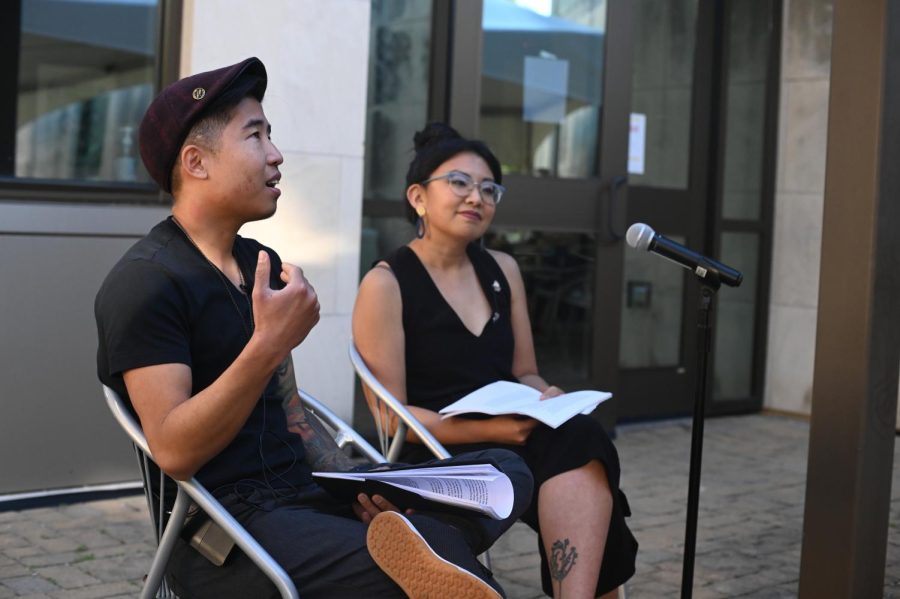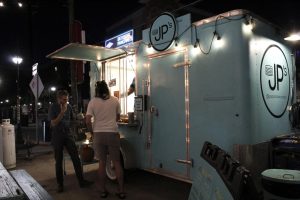Assistant professor shares experiences in book ‘Constellating Home’
Assistant professor Jo Hsu speaks about his book “Constellating Home” at the MPR patio on the on Oct. 25, 2022.
October 28, 2022
The characters for writer in Mandarin Chinese — 作家 (zuòjiā) — mean “to make a home.” When rhetoric and writing assistant professor Dr. Jo Hsu began planning their book, they said visions of overlapping stories and unique connections that bring all people together took shape. Drawing on these ideas, Hsu included two key words in the title of their book: “Constellating Home.”
“(The title) has the two central ideas that I hope folks take away from (the book), and the first one comes from my favorite language fact,” Hsu said. “It worked very well in terms of capturing what I see these different marginalized writers doing and what I’m trying to model in my own book.”
Organized by UT’s Center for Asian American Studies, Dr. Jo Hsu hosted a book launch at the MPR Patio on Tuesday, where they discussed their work and read sections from their new release. Hsu said their first book, “Constellating Home: Trans and Queer Asian American Rhetorics,” revolves around the trials and triumphs of LGBTQ+ and disabled Asian American experiences.
“At the core of the book is an exploration of how marginalized communities use storytelling as a means of enacting social and political change,” Hsu said. “The journey of the book was the best part, and I got to spend time with communities I wouldn’t have met otherwise.”
Part of Hsu’s storytelling process involved traveling to California to meet instructors, organizers and activists who fight for LGBTQ+ Asian American inclusion. Hsu said their motivation to write the book stemmed from the lack of opportunities for them to interact with marginalized communities.
“It began with, ‘What does that community look like?’” Hsu said. “‘What are people missing when they’re not listening to the voices from these communities?’ Along with (a) question with a lot of my work, ‘How can we use (storytelling) in ways to create worlds that are more livable for marginalized people?’”
The Gender and Sexuality Center’s Lotus Project participants listened to Hsu’s words Tuesday as a collective. The Lotus Project organizes biweekly discussions and provides a safe space for Asian American women and LGBTQ+ communities.
“(It’s) part of us trying to make sure we build community within our discussion groups but also reach out to the wider community at UT and Austin,” said Lilli Hime, a program coordinator at the Gender and Sexuality Center. “I hope the event pushes (attendees’) imagination of what it looks like to be queer, trans and Asian.”
Jami Nakamura Lin, a fellow Asian American author, joined Hsu for the event in light of her October 2023 memoir, “The Night Parade,” which reflects on Lin’s bipolar disorder and her father’s death through various Japanese folklore. Lin said she enhanced her personal stories with mythology and metaphors after struggling with writing about her bipolar disorder during graduate school.
“I started diving into mythology and folklore,” Lin said. “Using that as a lens allowed me to be able to talk about my own history in a larger viewpoint that connected it not only to my own experience, but (also to) cultural ideas and what we’ve been afraid of for generations of society.”
While aspiring Asian American authors may feel intimidated sharing their personal stories, Hsu said their perspectives make their voices all the more essential.
“You have to just put words on pages and trust that they’ll come together into something meaningful,” Hsu said. “I hope that all folks out there who find themselves discouraged but feel they have something to say keep putting words on pages, and we get to see them.









